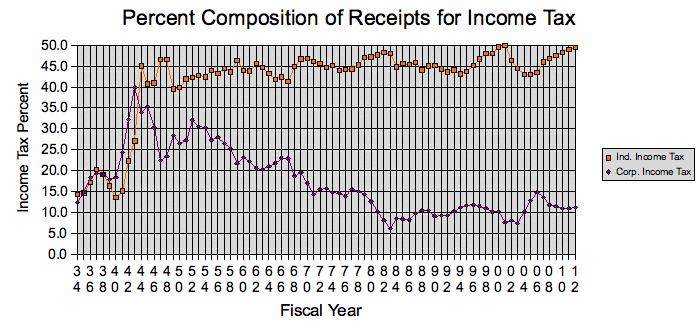In “A Taxing Situation Part 1,” I proved that the United States has a regressive tax system, and that all income must be taxed equally. In this posting I demonstrate the need to raise corporate taxes in order to achieve tax fairness. For individual tax payers FICA taxes on can be eliminated, and the lost revenue replaced by raising corporate income taxes. Tax fairness among corporations can be achieved by eliminating tax breaks or tax increases for specific industries or corporations.
Corporations are not paying their fair share in taxes. According to the Wall Street Journal (April 6, 2004): “More than 60% of corporations paid zero corporate tax between 1996 and 2000. Corporate tax revenue has declined from 200 billion in 2000 to 131.8 billion in 2003.” A more recent study determined that, “Two out of every three United States corporations paid no federal income taxes from 1998 through 2005.”
The graph that follows, Graph 1, illustrates the disparity in percent between the amount that corporations and individuals contribute to total tax revenue received (receipts) by the Federal Government.
 Years 2007 through 2012 are estimates
Years 2007 through 2012 are estimates
Graph 1*
As Graph 1 shows, corporate income taxes as Percent Composition of Receipts have gone down from about 35% in 1945 to about 12% in 2008 for a 66% decrease. Yet, during the same period, Percent Composition of Receipts for individual income taxes have gone up from 41% to 47% for a 15% increase. Table 1, “Summary of Changes in Taxes Paid,” puts this in perspective. As Table 1 illustrates, if both an individual and corporation paid $10,000 in income taxes in 1945, then the individual’s taxes increased to $11,500, while the corporation’s taxes decreased to $3,400 in 2008.
Table 1: Summary of Change in Taxes Paid
-
Year
% Composition, Individual Taxes
% Composition, Corporate Taxes
Individual Taxes
Corporate Taxes
1945
41%
35%
$10,000
$10,000
2008
47% (estimated)
12% (estimated)
$11,500
$3,400
Tax fairness can be achieved by eliminating FICA taxes on individuals and replacing the lost revenue by raising corporate income taxes. FICA taxes compose 35% of the Percent Composition of Receipts received by the Federal Government. Assuming an even split in FICA taxes between individuals and corporations, individuals now pay 64.5% of taxes while corporations now pay 29.5% of taxes. If we make corporations pay all FICA taxes, their percentage of total taxes received by the Federal Government would be 47%, the same as individuals. Table 2 summarizes this information.
Table 2: Percent of Composition of Receipts by Source
|
Entity |
% Composition Income Tax of Federal Tax Receipts |
% Composition Income Tax plus FICA of Federal Tax Receipts |
Proposed % Composition Income Tax of Federal Tax Receipts |
|
Individual |
47% |
64.5% |
47% |
|
Corporate |
12% |
29.5% |
47% |
For most individuals, abolishing FICA taxes for would result in a 7.65% increase in disposable income.
To achieve tax fairness among corporations eliminate tax breaks or tax increases earmarked for specific industries or corporations. One industry’s or corporation’s tax break is another’s tax increase. These tax breaks, at their worst, also allow some corporations to avoid paying taxes entirely. As for tax increases, due to high oil prices, oil companies are making record profits, and Congress is discussing adding a windfall profits tax. Congress wants to add an exception to the exception to make the tax code fair. Just eliminate the exceptions, and have a progressive corporate income tax system.
To summarize A Taxing Situation, Parts 1 and 2:
- Income must be taxed the same regardless of income origin.
- FICA taxes must be abolished for individuals.
- Replace FICA taxes by increasing the corporate tax rate on a progressive scale.
- Remove all special tax breaks or special tax increases so that corporations pay their fair share in taxes.
These changes will make the tax code simple, fair, and efficient.
__________
*Data derived from Historical Tables Budget Of The United States Government Fiscal Year 2009